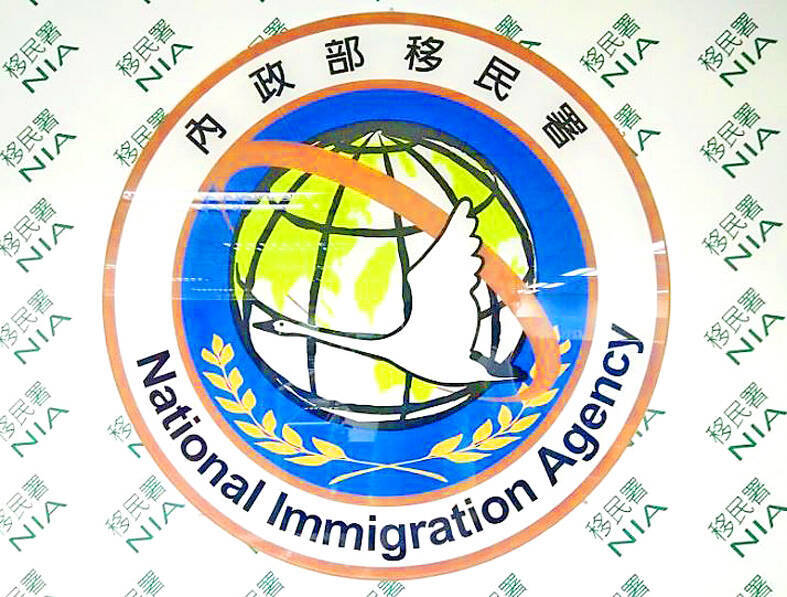Foreign spouses from China outnumber those from other countries, with their paths to acquiring Taiwanese citizenship differing, a National Immigration Agency (NIA) official said on Sunday.
From 1987, when the government allowed people to visit China, until Jan. 1 this year, the number of Chinese nationals marrying Taiwanese totaled 384,067, including 157,488 who have obtained permanent residence or citizenship in Taiwan, agency data showed.
Among Chinese spouses, 362,093 were from the mainland, and 21,974 from Hong Kong and Macau.

Photo copied by Liu Ching-ho, Taipei Times
During the same period, non-Chinese foreigners marrying Taiwanese totaled 209,647, with Vietnamese topping the list at 116,883, followed by Indonesians (31,971), Filipinos (11,604), Thais (10,133), Japanese (5,963), Cambodians (4,376) and South Koreans (2,268).
Another 26,449 foreign spouses were from other countries.
“In the early 1990s when cross-strait travel was first allowed, many Taiwanese businessmen went to China and returned with wives from there,” an NIA official said on condition of anonymity.
“During those early years, there were many agencies specializing in introducing Chinese women from rural areas to Taiwanese men,” the official said.
One of the reasons for the trend was that people from China share a common language with Taiwanese, making communication easy, the official said.
Relatives of Chinese spouses who are 12 years old or younger, or aged 70 or older can apply for long-term residency in Taiwan as dependents, the official said, adding that only about 60 people per year do so.
“Due to the policy of mutual non-recognition between the two sides of the Taiwan Strait, the requirements for Chinese nationals to obtain Taiwanese citizenship are different from those for other foreign nationals,” the official said.
The Act Governing Relations Between the People of the Taiwan Area and the Mainland Area (臺灣地區與大陸地區人民關係條例) regulates Chinese spouses’ applications, the official said.
Spouses from China first apply for residency as a dependent after registering their marriage. After staying in Taiwan for at least 183 days per year for four years, a Chinese spouse can apply for long-term residence, the official said.
After staying for at least 183 days per year for another two years, Chinese spouses can apply for permanent residence in Taiwan, provided they cancel their household registration in China, the official said, estimating that the whole process takes about six years.
However, “applicants who apply for permanent residency must provide proof of loss of Chinese household registration. Some people apply for permanent residency first, but fail to provide the necessary documents within the required three-month period,” the official said.
“In that case, the person cannot set up household registration in Taiwan and apply for an ID card,” the official said.
Data from the Department of Household Registration showed that since 2016, a total of 45,626 people from China, Hong Kong and Macau had obtained Taiwanese ID cards.
The process for foreigners from other countries is different, as they are regulated by the Nationality Act (國籍法), which involves first holding an Alien Resident Card and staying in Taiwan for at least 183 days per year for three years.
The applicant can then apply to renounce their original citizenship and start their Taiwanese naturalization process, the official said.
This could take between one and five years, the official said, estimating that the whole process takes about four to eight years.
The main difference between Chinese and other foreign spouses is the latter have to give up their original citizenship, as well as pass a naturalization test, or participate in a new-immigrant training course, the official said.
Statistics from the Department of Household Affairs and the NIA, as of January this year showed that a total of 140,596 foreign spouses from countries other than China had acquired Taiwanese citizenship.
There are currently 69,051 non-Chinese foreigners living in Taiwan, including 51,105 spouses who are dependent on relatives in Taiwan, and 10,764 foreign spouses who hold permanent residence permits and have not applied for naturalization.

Costa Rica sent a group of intelligence officials to Taiwan for a short-term training program, the first time the Central American country has done so since the countries ended official diplomatic relations in 2007, a Costa Rican media outlet reported last week. Five officials from the Costa Rican Directorate of Intelligence and Security last month spent 23 days in Taipei undergoing a series of training sessions focused on national security, La Nacion reported on Friday, quoting unnamed sources. The Costa Rican government has not confirmed the report. The Chinese embassy in Costa Rica protested the news, saying in a statement issued the same

Taiwan is to extend its visa-waiver program for Philippine passport holders for another year, starting on Aug. 1, Minister of Foreign Affairs Lin Chia-lung (林佳龍) said on Friday. Lin made the announcement during a reception in Taipei marking the 127th anniversary of Philippine independence and the 50th anniversary of the establishment of the Manila Economic and Cultural Office (MECO) in Taiwan, the Ministry of Foreign Affairs said. The decision reflected Taiwan’s commitment to deepening exchanges with the Philippines, the statement cited Lin as saying, adding that it was a key partner under the New Southbound Policy launched in 2016. Lin also expressed hope

Temperatures in New Taipei City’s Sindian District (新店) climbed past 37°C yesterday, as the Central Weather Administration (CWA) issued heat alerts for 16 municipalities, warning the public of intense heat expected across Taiwan. The hottest location in Taiwan was in Sindian, where the mercury reached 37.5°C at about 2pm, according to CWA data. Taipei’s Shilin District (士林) recorded a temperature of 37.4°C at noon, Taitung County’s Jinfeng Township (金峰) at 12:50 pm logged a temperature of 37.4°C and Miaoli County’s Toufen Township (頭份) reached 36.7°C at 11:40am, the CWA said. The weather agency yesterday issued a yellow level information notice for Taipei, New

CASE: Prosecutors have requested heavy sentences, citing a lack of remorse and the defendants’ role in ‘undermining the country’s democratic foundations’ Five people affiliated with the Chinese Nationalist Party (KMT), including senior staff from the party’s Taipei branch, were indicted yesterday for allegedly forging thousands of signatures to recall two Democratic Progressive Party (DPP) lawmakers. Those indicted include KMT Taipei chapter director Huang Lu Chin-ru (黃呂錦茹), secretary-general Chu Wen-ching (初文卿) and secretary Yao Fu-wen (姚富文), the Taipei District Prosecutors’ Office said in a news release. Prosecutors said the three were responsible for fabricating 5,211 signature forms — 2,537 related to the recall of DPP Legislator Wu Pei-yi (吳沛憶) and 2,674 for DPP Legislator Rosalia Wu (吳思瑤) — with forged entries accounting for